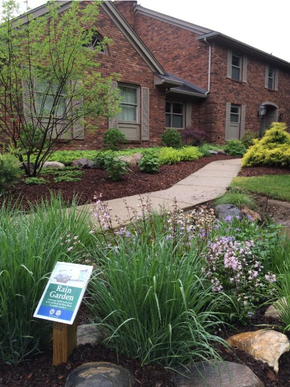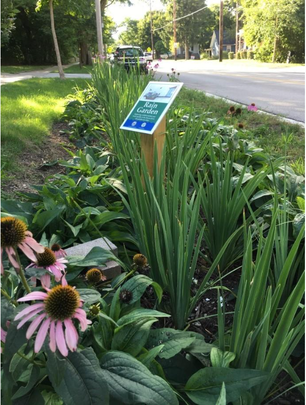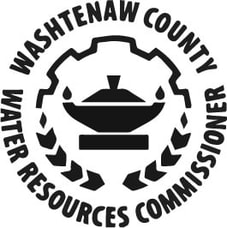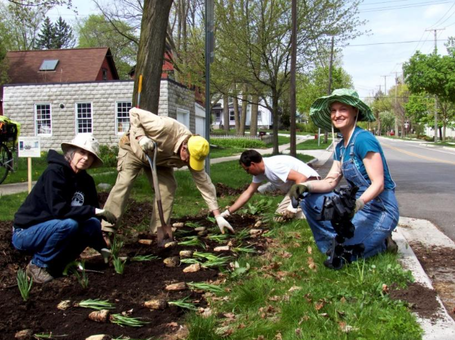Featured 2023 Native Plant Expo & Marketplace Sponsor:

Plant a beautiful Rain Garden in your yard – and help keep our waterways clean!
Planting a Rain Garden is fun! And a way for people to make a positive impact on the quality of the water in our rivers and streams. It starts in our own back yards. Rain gardens capture stormwater runoff before it pollutes our local rivers. When it rains, a rain garden captures the runoff from a roof or driveway. One inch of rainfall means 600 gallons of water will be captured by a typical rain garden. This is water that won't go to municipal pipes, won't add pollution to the river, and won't contribute to flooding. This water will replenish the groundwater. But before it does, it keeps the garden looking green and lush.
There are over 1,000 rain gardens here in our community – and you can build one too! You don’t need any special equipment – just some space, a spade, compost, and a few plants. It’s a fun activity for the whole shovel-wielding family now that the weather is getting warmer, the sun is out, and everyone wants to be outside.
Did you know Washtenaw County has a rain garden assistance program? We can help you design a rain garden for your yard too. Request a free one-on-one rain garden design assistance visit. Our staff visits almost 90 county residents a year – giving advice about rain gardens. The gardeners themselves dig the garden, and plant it. Remember to get your native plants at a local nursery, or our Conservation District Native Plant Expo.
Planting a Rain Garden is fun! And a way for people to make a positive impact on the quality of the water in our rivers and streams. It starts in our own back yards. Rain gardens capture stormwater runoff before it pollutes our local rivers. When it rains, a rain garden captures the runoff from a roof or driveway. One inch of rainfall means 600 gallons of water will be captured by a typical rain garden. This is water that won't go to municipal pipes, won't add pollution to the river, and won't contribute to flooding. This water will replenish the groundwater. But before it does, it keeps the garden looking green and lush.
There are over 1,000 rain gardens here in our community – and you can build one too! You don’t need any special equipment – just some space, a spade, compost, and a few plants. It’s a fun activity for the whole shovel-wielding family now that the weather is getting warmer, the sun is out, and everyone wants to be outside.
Did you know Washtenaw County has a rain garden assistance program? We can help you design a rain garden for your yard too. Request a free one-on-one rain garden design assistance visit. Our staff visits almost 90 county residents a year – giving advice about rain gardens. The gardeners themselves dig the garden, and plant it. Remember to get your native plants at a local nursery, or our Conservation District Native Plant Expo.
The Washtenaw County Rain Garden Program also teaches people all over Washtenaw County how to plant rain gardens. Every year we train interested folks to design rain gardens by teaching the Master Rain Gardener class. People attend five classes, which culminate in their own design of a rain garden. Then they dig and plant it themselves. They are a certified Master Rain Gardener – able to answer neighbor’s questions about rain gardens and serving as a rain garden ambassador. Enroll in our Master Rain Gardener program to learn how to design a rain garden yourself, view class videos, or review our wide variety of online resources – including our step-by-step guide – the Rain Garden Handbook.

Want to volunteer?
There are lots of opportunities to volunteer. Even if you can’t install your own rain garden, you can help maintain a public rain garden. You might have seen rain gardens planted along Miller Avenue, from Newport to Maple Road, or along Madison Road and Stone School Road in Ann Arbor, and in many parks county-wide. Volunteers maintain those gardens weeding and removing trash. There are other rain gardens in parks that need some tender loving care. If you would like to help by adopting a rain garden, contact Catie Wytychak at the Water Resources Commissioner’s Office [email protected].
The rain garden assistance program and the volunteer program are made possible through a partnership between the Washtenaw County Water Resources Commissioner’s Office and the City of Ann Arbor. Live in Ann Arbor? Get a break on the stormwater portion of your utility bill by getting a rain garden Ann Arbor Utility Bill Credit. Ann Arbor collects a stormwater fee to pay for stormwater conveyance – there are a lot of pipes underground that bring rainwater to the river. To reduce the load on those pipes, and get a credit for doing so, build a rain garden that captures at least 50% of the area of your roof, and is at least 130 square feet. Send your info to [email protected] to receive a credit on your next utility bill.
There are lots of opportunities to volunteer. Even if you can’t install your own rain garden, you can help maintain a public rain garden. You might have seen rain gardens planted along Miller Avenue, from Newport to Maple Road, or along Madison Road and Stone School Road in Ann Arbor, and in many parks county-wide. Volunteers maintain those gardens weeding and removing trash. There are other rain gardens in parks that need some tender loving care. If you would like to help by adopting a rain garden, contact Catie Wytychak at the Water Resources Commissioner’s Office [email protected].
The rain garden assistance program and the volunteer program are made possible through a partnership between the Washtenaw County Water Resources Commissioner’s Office and the City of Ann Arbor. Live in Ann Arbor? Get a break on the stormwater portion of your utility bill by getting a rain garden Ann Arbor Utility Bill Credit. Ann Arbor collects a stormwater fee to pay for stormwater conveyance – there are a lot of pipes underground that bring rainwater to the river. To reduce the load on those pipes, and get a credit for doing so, build a rain garden that captures at least 50% of the area of your roof, and is at least 130 square feet. Send your info to [email protected] to receive a credit on your next utility bill.
- Susan Bryan, Washtenaw County Water Resources Commissioner’s Office, Rain Garden Coordinator.



